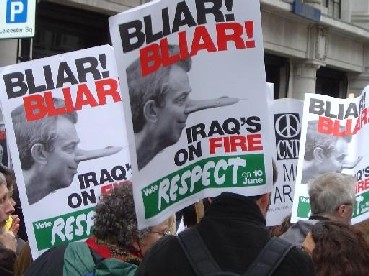|
The special relationship between the British Isles
and its superpower pal across the pond is surely the
envy of all. Like a tango-dancing duo, the US leads and
Britain seemingly delights in dancing to its tune no
matter how discordant or garish.
And like the buddies they are, when America was attacked on
September 11, 2001, Britain behaved as though it was the
51st state, sending its soldiers off to seek
a bearded millionaire troglodyte and a devilish
nuke-wielding dictator; introducing Britain's answer to
the Patriot Act and opening up a mini Guantanamo called
Belmarsh.
As part of his "shoulder to shoulder" commitment and to cement the
'special relationship', the British Prime Minister Tony
Blair has liberally dug into the country's tax coffers,
fallen out with his EU 'Old Europe' colleagues, been
condemned as a possible war criminal by human rights
organizations, termed 'a liar' by his parliamentary
colleagues and 'a poodle' by his people.
Naturally, the best relationships imply give and take, and this
one is no exception. Britain gives and the US takes.
We began to have an inkling of this weird imbalance when the
Pentagon ignored British requests for the repatriation
of Britons at Gitmo, and whereas American nationals,
such as the so-called American Taliban John Walker Lindh
was afforded a fair trial on his home ground, British
detainees were locked up without access to family or
lawyers.
Then despite the US being Britain's partner in crime in Iraq – for
a crime it surely is – George W. Bush refused to sign up
to the International Criminal Court whereas Britons and
the citizens of most other countries are governed by its
jurisdiction.
This means that senior members of the Blair government and members
of the British armed services could one day find
themselves alongside Slobodan Milosovich in The Hague
for war crimes or human rights abuses committed by
Americans during an illegal invasion with British
participation.
When it comes to bi-lateral and multi-lateral treaties, the Bush
administration is famous for putting its own interests
first. Prime examples are Kyoto on climate change, which
Bush refuses to ratify and the Anti-ballistic missile
(ABM) treaty he unilaterally shredded.
The US government's self-interested trade policies are evident
too. Remember the tariffs it imposed on imported steel
in contravention of the World Trade Organization's
rules, lifted in 2004 when the EU and Asia threatened to
retaliate? Bush knew those tariffs were illegal, yet he
went ahead anyway.
Indeed, the current administration uses Free Trade Agreements (FTAs)
as both carrots and sticks to bend smaller nations into
doing its bidding and invariably those agreements end up
being heavily weighted in America's favor.
For instance, during its current negotiations over a bi-lateral
FTA with the UAE, the US is demanding that the Emirates
dispenses with the death penalty as a pre-condition. The
hypocrisy inherent in this is, of course, glaring.
Also glaringly one-sided are the terms of a 2003 extradition
treaty signed by both the US and Britain for the
ostensible purposes of fast-tracking the detention and
conviction of terrorist suspects, while America demands
prime facie evidence as a pre-requisite to sending its
own citizens into the hands of foreign custodians,
Britain merely requires a wink and a nod along with
proof of the requested individual's identity.
There's more. Although the original purpose of the treaty was to
cut away red tape and shorten the time-frame when
dealing with extraditable terrorist suspects, it is now
being liberally used by the US to extradite the alleged
perpetrators of white collar crimes, even if those
offences were not committed in the US. Out of the 43
such requests made by the US to Britain since the treaty
was invoked, half have involved alleged white collar
criminals.
There are several cases ongoing. The first relates to three former
British bankers – David Bermingham, Giles Darby and Gary
Mulgrew – known as "the Bermingham three".


A Texas court has requested their extradition in relation to their
alleged involvement with the Enron scandal at a time
they were employed by the NatWest Bank, a subsidiary of
the Royal Bank of Scotland Group. The men are suspected
of plotting with Enron executives to persuade NatWest to
sell its shares in a Cayman Island company to Enron for
a rock-bottom sum.
In the event there was a discrepancy between the US$1 million,
which NatWest received for its stake and the US$20
million shelled out by Enron. The differential, alleges
the Texan court, was pocketed by the Bermingham three
along with Enron's Andrew Fastow and Michael Kopper.
The Bermingham three's lawyer naturally defends his clients'
innocence, but whatever the truth of the matter he makes
an excellent point. The three are all British nationals,
their alleged offence took place in Britain and their
former employer was a British bank. But, nevertheless,
the British Home Secretary Charles Clarke is prepared to
hand them over to the jurisdiction of a foreign court on
seven counts of wire fraud without batting an eyelid.
The trio, on the other hand, are prepared to fight tooth and nail
to stay in Britain given the murky reputation of the
Texas legal system, and are prepared to appeal the Home
Secretary's decision before the House of Lords and,
should that be unsuccessful, before the European Court
of Human Rights. Furthermore, they say that if they were
to be brought up before a British court, their case
would not stand up.
Another Briton who may have to pack his suitcase and head across
the Atlantic is Gary McKinnon of north London. The US
Department of Defense has accused McKinnon of hacking
into 97 Pentagon, Army, Navy and NASA computers between
February 2001 and March 2002 thus triggering almost a
million dollars losses.
McKinnon was arrested in Britain during 2002 and released without
charge but, once again, the US government is
relentlessly pursuing its prey, ignoring the fact that
the treaty was set-up to cover violent crimes and
terrorism.
Karen Todner, McKinnon's lawyer, said: "We believe that as a
British national, he should be tried here in our own
courts by a British jury and not in the US."
Ian Norris, formerly the chief executive of the British
engineering firm Morgan Crucible, is being head hunted
by the US courts for alleged carbon price-fixing by two
of Morgan Crucible's US subsidiaries between 1989 and
2000 even though such cartel activities were not deemed
criminal offences in Britain until 2003.
Like the others, Norris has appealed against extradition to the US
and has been turned down, and like the others, he
intends to take his case all the way up to the House of
Lords.
There are currently 19 non-Americans in US jails for violating
anti-trust laws but Norris is the first to be sought for
extradition. In the event the American request is
successful, US prosecutors believe the flood gates could
be opened for many other British executives to follow,
especially since, under the treaty, there is no statute
of limitation.
And who knows where these onslaughts against price-fixers may
lead. Conceivably, the day could arrive when the US
decides that OPEC is a price-fixing cartel and
consequently goes after it.
The May 12 Economist quotes deputy assistant
attorney-general Scott Hammond as telling a conference
on white-collar crime: "To have the UK to be the first
government to bat for us in seeking extradition is
remarkable."
Yes, it surely is remarkable. Indeed, the UK government appears to
be selfless when it comes to handing over its own
citizens to foreigners without requiring similar
courtesies in return and ratifying treaties that offer
its co-signatory most of the cream, provided that
co-signatory is the US.
If well-heeled, educated white collar executives are being hauled
off to face justice American-style, then what chance do
British Muslims accused of terrorist activities have?
Under the 2003 Treaty, a British judge has ruled that 31-year-old
Babar Ahmad, a computer whiz from London, is ripe for
extradition to the US due to claims that he used
Internet sites in order to incite the murder of US
servicemen.
Judge Timothy Workman, who denied Ahmad's appeal against the
proposed extradition, gave the impression that he wasn't
too happy with his own ruling but due to the provisions
of the treaty, his hands were tied.
"This is a difficult and troubling case," he told the court. "The
defendant is a British subject, who is alleged to have
committed offences, which, if the evidence were
available, could have been prosecuted in this country.
Nevertheless, the Government of the United States is
entitled to seek his extradition under the terms of the
treaty and I'm satisfied that…none of the statutory bars
apply…"
The case has caused outrage among the British Muslim community and
led to a series of street protests. Iqbal Sacranie, the
Secretary-General of the Muslim Council of Britain
commented: "This is a very sad day for all who value
fairness and justice. The US can now simply order that
British citizens be plucked from our streets and into US
jails by making serious and wholly unproven allegations
against them."
Someone who knows all about serious and unproven allegations is
Derek Bond, a British grandfather and retired
engineering consultant in his mid-70s who spent three
weeks in a South African jail on the say-so of the FBI.
Bond had set-off on a dream vacation with his wife but
before he had time to unpack, he was arrested.
The US told the South Africans that the man they had in custody
wasn't really Derek Bond but a fraudster called Derek
Sykes. The weeks went past and the FBI didn't even
bother to turn up to interrogate 'their man' and if it
wasn't for the fact the real Derek Sykes was discovered
in Las Vegas, who knows, Mr. Bond could still be behind
bars.
It is surely time for the so-called 'special relationship' between
Britain and the US to be re-assessed. Britons can be
forgiven for thinking 'with friends like these who needs
enemies?' But to be fair, the US isn't wholly to blame.
It has been allowed to get away with behaving in any
which way it pleases by a sycophantic Downing Street.
Recently, Mr. Blair went to Washington to draw on his political
capital with George Bush – or, rather the political
capital he thought he had – over climate change and an
end to poverty in Africa. He returned with a fist-full
of dollars, representing a drop in the ocean when
compared to the sums the White House spends on wars, and
little else.
Earlier, he had hoped that Bush would take a personal interest in
the creation of a Palestinian state but all he got was
plenty of lip-service.
The special relationship is nothing more than a one-way street
with Britons as the losers. Indeed, the Prime Minister's
masochism has become an embarrassment.
Margaret Thatcher was fond of saying 'this lady's not for turning'
but in Blair's case he should make a U-turn and fast,
starting with the tearing up of a treaty that takes
British bankers, computer experts and engineers away
from their families, friends and lawyers and places them
before American courts without any evidence of
wrong-doing.
The greatest irony is surely this. The Bush administration is
concerned about getting its mitts on Britons involved in
price-fixing cartels, yet thought nothing about
supporting Ahmad Chalabi's bid for the leadership of
Iraq, even while he was wanted by Jordan for
embezzlement. Furthermore, it installed as its
ambassador there John Negroponte, one of the main
players in the Iran-Contra scandal.
Sad to say, there is only one thing special about Britain's
relationship with the US and that's the frequency with
which the British Prime Minister gets to chew burgers at
Crawford and choke back his nation's pride.
| 